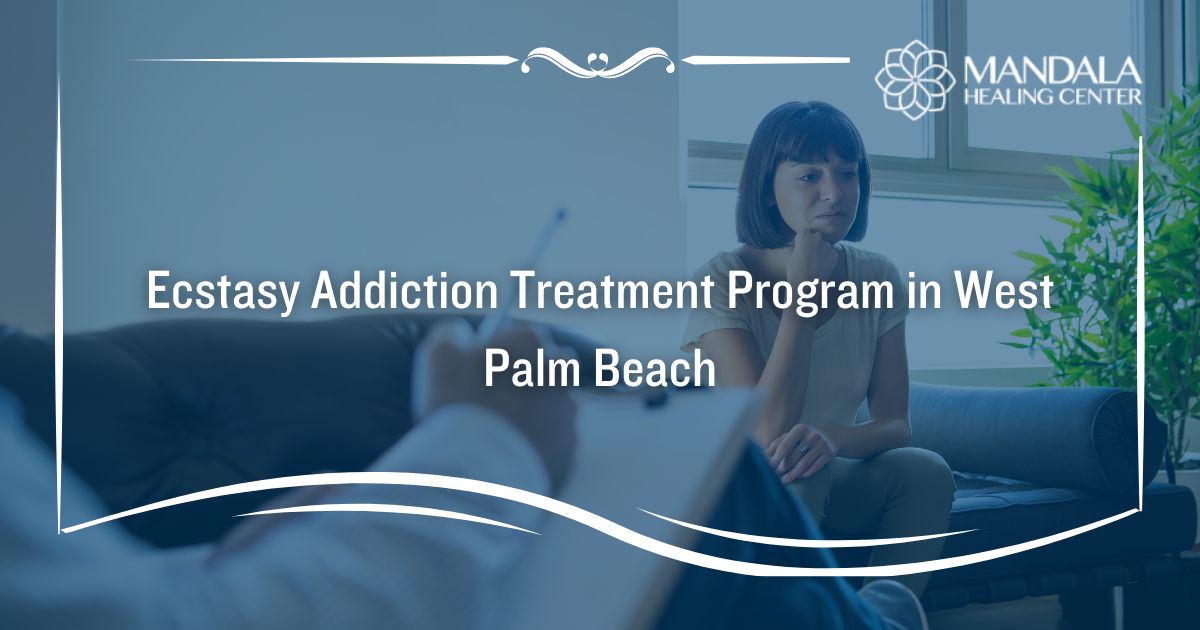Ecstasy (MDMA) is considered a stimulant drug, as it increases activity in the central nervous system. It can also cause hallucinations, feeling close to others, and changes in sensory perception.
According to the National Institute on Drug Abuse (NIDA), 2.2 million people have reported using MDMA in the past 12 months.[1]
Ecstasy is usually abused in party, club, or rave scenes. If you misuse ecstasy, you could be at risk of developing an addiction. MDMA addiction requires professional treatment that includes a combination of detox, therapy, and relapse prevention planning.
In this article, you will learn:
- What ecstasy is
- How ecstasy addiction treatment centers work in West Palm Beach
- The importance of medical detox
- How services like therapy and relapse prevention can help you stay sober
What is Ecstasy?
Ecstasy is considered a stimulant drug even though it also causes hallucinogenic effects. You might find MDMA in the form of bright-colored pills, tablets, or crushed-up crystals. Most people swallow ecstasy, however, it is possible to snort it as well.
The common side effects of ecstasy include:[2]
- Increased energy
- Fast heart rate and increased blood pressure
- Excessive sweating and increased body temperature
- A rush of euphoria
- Distortions in time and perception
- Enhanced feelings of pleasure
- Reduced inhibitions
- Feelings of closeness and empathy
- Slight hallucinations like brighter colors or traces of light
- Synesthesia (i.e. “feeling colors” and “seeing music”)
Ecstasy increases the amount of serotonin available in your brain. Once it wears off, you will be depleted of serotonin, which will make you feel depressed, fatigued, and lousy overall.
If you attempt to use ecstasy repeatedly, it will not produce as potent of an effect because your serotonin levels are depleted. This might cause you to continue chasing a high that is impossible to attain, leading to an addiction to ecstasy.
How Does Ecstasy Addiction Treatment in West Palm Beach Work?
Ecstasy addiction must be treated in a professional setting. During an addiction treatment program in West Palm Beach, you will have access to medical detox, individualized treatment plans, evidence-based therapies, and more. Understanding how rehab works might make you more comfortable with the idea of receiving help.
During treatment for ecstasy addiction in West Palm Beach, you can expect:
Assessment
The first step in ecstasy rehab is an in-depth assessment. Medical professionals will ask you questions about your physical and mental health as well as your history of ecstasy abuse. The information gathered will be used to create an individualized treatment plan based on your needs.
Your treatment plan could include things like whether you need medical detox, if you require treatment for co-occurring mental health conditions, and what types of therapies you’d benefit from.
Detox
After your assessment, you will transition into a medically monitored detox. When you suffer from a substance use disorder, that means your brain and body rely on the drug to function properly. As a result, you will experience withdrawal symptoms upon stopping ecstasy use.
During detox, your physical health will be monitored to ensure you remain stable. Additionally, you might be given medications to soothe your withdrawal symptoms and cravings as ecstasy leaves your body.
Evidence-Based Therapies
During a rehab program for ecstasy addiction, you will engage in a range of evidence-based therapies. You will participate in both individual counseling and group therapy. To explain, individual therapy helps you overcome sensitive topics like trauma, while group therapy is ideal for developing coping skills, gaining support, and learning how to communicate effectively.
Examples of evidence-based therapies for substance abuse include:[3]
- Cognitive behavioral therapy (CBT)
- Motivational interviewing (MI)
- Contingency management (CM)
- The matrix model
- 12-step facilitation therapy
- Family behavior therapy
Relapse Prevention and Aftercare
Once you are nearing the end of your inpatient treatment program, you will begin a process called relapse prevention planning. This involves identifying triggers for substance abuse, learning healthy coping mechanisms, and developing a plan in case you experience a relapse.
A vital part of your relapse prevention plan will be aftercare. Ecstasy addiction treatment programs in West Palm Beach offer aftercare services like:
- Continued therapy
- Medication management
- Access to alumni support groups
- Referrals to outpatient treatment or sober living programs
- Recommendations on local support groups
- Case management services like vocational training and assistance
Get Connected to an Ecstasy Rehab Center in West Palm Beach
If you or a loved one suffers from ecstasy addiction, it’s time to seek help. The Mandala Healing Center is here to help you regain control over your life, one step at a time. We offer evidence-based treatments combined with holistic services to ensure you achieve long-lasting sobriety.
Contact us today for more information on our treatment options for ecstasy addiction.
References:
- The National Institute on Drug Abuse (NIDA): What is the scope of MDMA use in the United States
- The Drug Enforcement Administration (DEA): Drug Fact Sheet: Ecstasy/MDMA
- The National Library of Medicine (NLM): Evidence-based practices for substance use disorders












